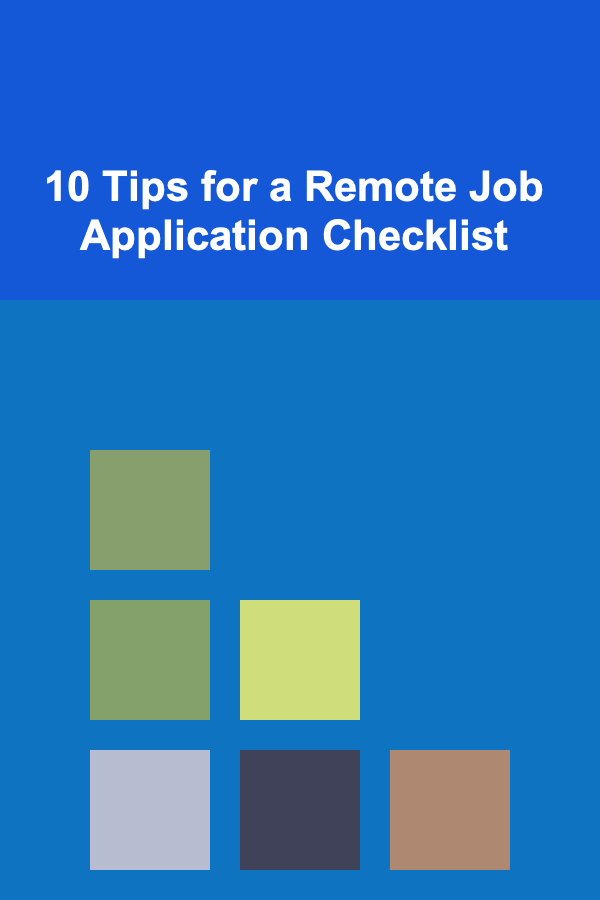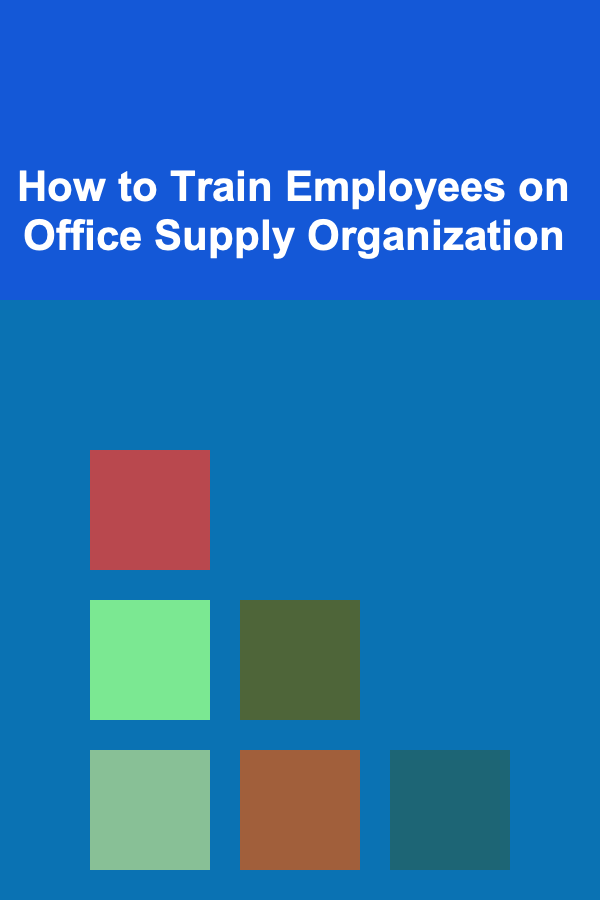
10 Tips for a Remote Job Application Checklist
ebook include PDF & Audio bundle (Micro Guide)
$12.99$11.99
Limited Time Offer! Order within the next:

In today's increasingly digital world, remote work has become an appealing option for many professionals. Whether you're seeking flexibility, better work-life balance, or the opportunity to work with global teams, applying for a remote job can be both exciting and daunting. Unlike traditional job applications, remote positions demand a unique approach, as they often come with a different set of expectations and challenges.
A well-prepared remote job application can significantly increase your chances of landing an interview. To guide you through this process, we've created a detailed checklist that covers essential tips to help you stand out when applying for remote jobs.
Research the Company and Its Remote Culture
Before applying for a remote job, it's crucial to do thorough research on the company, especially regarding its remote work culture. Not all companies are equally suited for remote work, and some may expect more flexibility or communication than others.
How to Research:
- Company Website: Look for a dedicated remote work section that might highlight the company's remote culture and expectations.
- Employee Reviews: Platforms like Glassdoor and Indeed often feature reviews from current and former employees who can provide insights into the company's remote work environment.
- Social Media: Follow the company on LinkedIn, Twitter, or other social platforms to learn about their remote policies, team dynamics, and company values.
This research ensures that you understand the company's ethos and can tailor your application to align with their values and expectations.
Tailor Your Resume for Remote Work
One of the most critical elements of a remote job application is a well-crafted, tailored resume. A generic resume may not stand out, and remote employers typically look for candidates who demonstrate specific skills that are well-suited to remote work.
Key Elements to Include:
- Remote Experience: Highlight any previous remote work experiences. Emphasize how you successfully managed remote projects, handled time zones, and worked independently.
- Communication Skills: Showcase your ability to communicate effectively in a remote setting. Include tools like Zoom, Slack, or Microsoft Teams that you're proficient in.
- Self-Discipline and Time Management: Remote work requires a high degree of self-motivation. Demonstrate how you've managed your time, met deadlines, and maintained productivity in past roles.
Craft a Compelling Cover Letter
Your cover letter is your opportunity to tell a story about why you're an ideal candidate for the remote role. It's a chance to show your enthusiasm for the company and remote work in general.
Focus on:
- Why Remote Work Appeals to You: Share personal experiences or reasons why you're seeking a remote role. Highlight any benefits you've enjoyed from previous remote experiences, such as better work-life balance, increased productivity, or flexibility.
- How You'll Contribute: Explain what you bring to the table and how your skills will be an asset to the remote team.
- Customization: Avoid using a generic cover letter. Personalize it by addressing the hiring manager by name and aligning your experiences with the company's specific needs.
Showcase Your Technical Skills
Remote jobs rely heavily on technology to ensure seamless collaboration, communication, and productivity. Employers expect you to be proficient in various tools and software that facilitate remote work.
Key Tools to Mention:
- Project Management Tools: Mention experience with Asana, Trello, or Monday.com.
- Communication Tools: Highlight your use of Slack, Zoom, or Skype for team communication.
- Document Sharing and Collaboration Tools: Show proficiency in Google Drive, Dropbox, or other cloud-based systems.
- Time Management Tools: Familiarity with tools like Toggl or RescueTime can demonstrate your ability to manage your time effectively.
Demonstrate Strong Communication Skills
In a remote work environment, communication is key. Without face-to-face interactions, being clear, concise, and proactive in your communication is even more important. Employers want to know that you can collaborate with colleagues across time zones and geographical boundaries.
How to Demonstrate Communication Skills:
- Provide Examples in Your Resume or Cover Letter: Share specific examples of how you've communicated effectively in previous remote roles, whether through video calls, emails, or team messaging platforms.
- Online Portfolio or Blog: If you have a blog, personal website, or portfolio, include it in your application. This can showcase your written communication skills and your ability to present ideas clearly.
- Discuss Challenges: Mention any challenges you've faced with remote communication and how you've overcome them. This shows you're proactive in improving communication.
Highlight Your Problem-Solving Skills
Remote work often requires individuals to solve problems independently. Employers need candidates who can think critically, take initiative, and find solutions with minimal supervision.
Showcase Your Problem-Solving Skills:
- Real-World Examples: Use specific examples in your resume and cover letter to describe how you've tackled problems in remote work settings. This could involve handling technical difficulties, dealing with a project delay, or navigating communication barriers.
- Self-Motivation: Discuss how you've taken the initiative to solve problems on your own, showcasing your ability to work autonomously.
Be Transparent About Your Availability and Time Zone
Time zone differences can pose challenges in remote work, so it's essential to be upfront about your availability. Some companies may have employees scattered across the globe and need candidates who can work flexible hours to collaborate effectively.
How to Be Transparent:
- Mention Your Time Zone in Your Resume or Cover Letter: Be clear about the time zone you're in and whether you're willing to adjust your hours to align with the company's needs.
- State Your Availability: If the role requires specific working hours or overlaps with the company's main office hours, mention your flexibility and willingness to accommodate those needs.
Prepare for Video Interviews
Video interviews are a common part of the remote hiring process, and it's crucial to prepare for them just as you would for an in-person interview.
Preparation Tips:
- Test Your Technology: Ensure your camera, microphone, and internet connection are working properly before the interview.
- Choose a Quiet and Professional Background: Make sure your environment is tidy, well-lit, and free from distractions.
- Dress Appropriately: Even though the interview is virtual, dress professionally to show you take the opportunity seriously.
- Practice Responses: Be ready to discuss your remote work experience, how you manage your time, and how you collaborate with remote teams.
Demonstrate Your Self-Discipline and Independence
In a remote job, you won't have a manager watching over your shoulder all day. Employers need candidates who are self-motivated, independent, and can stay productive without constant supervision.
Showcasing Self-Discipline:
- Provide Examples of Independent Projects: Highlight past work where you took the initiative and worked independently to achieve a goal.
- Discuss Time Management Strategies: Share the techniques you use to stay organized and focused, such as time blocking, using productivity tools, or setting personal deadlines.
- Mention Any Remote Work Certifications: If you have taken any courses or earned certifications in remote work or project management, include them in your application.
Follow Up with a Professional Email
After submitting your application, it's always a good idea to follow up with a polite and professional email. This shows your enthusiasm for the role and can help keep your application top of mind.
How to Follow Up:
- Timing: Wait about one week after applying before following up. If you had an interview, follow up within 24-48 hours to express gratitude and reiterate your interest.
- Keep It Short and Professional: Your follow-up email should be concise and polite. Express your continued interest in the role and ask if there are any updates on the hiring process.
Conclusion
Applying for remote jobs requires a different approach than traditional in-person positions. By following this checklist, you can ensure that your application stands out in a competitive job market. Focus on tailoring your resume and cover letter, demonstrating your remote work skills, and preparing for the interview process. With persistence and attention to detail, you can successfully navigate the remote job application process and land the position that fits your skills and career goals.
If you need assistance with crafting your application materials or want personalized tips for specific remote job opportunities, feel free to reach out for additional support!
Reading More From Our Other Websites
- [Personal Care Tips 101] How to use Body Butter for a Natural Glow Before a Night Out
- [Trail Running Tip 101] Best Cooling Gel Packs for Hot Desert Trail Runs
- [Home Soundproofing 101] How to Choose the Best Materials to Absorb Sound in Your Home
- [Toy Making Tip 101] Safety First: Navigating Regulations and Quality Standards in Toy Production
- [Organization Tip 101] How to Reduce Food Waste and Save Money
- [Home Security 101] How to Use Smart Window Blinds to Enhance Privacy and Block Intruders
- [Organization Tip 101] How to Declutter Your Email Inbox Effectively
- [Organization Tip 101] How to Organize Board Games and Puzzles in Your Living Room
- [Home Maintenance 101] How to Protect Your Home's Wooden Deck from the Elements
- [Ziplining Tip 101] Best Zipline Courses in the World: Ranked by Difficulty & Views

How to Leverage Technology to Track Your Financial Progress
Read More
How to Plan a Family Movie Marathon on a Budget
Read More
How to Plan Your Dream Vacation with Discounted Travel Deals
Read More
How to Train Employees on Office Supply Organization
Read More
How to Fuel Your Brain for Peak Performance
Read More
How to Use a New Year's Resolution Checklist to Improve Your Relationships
Read MoreOther Products

How to Leverage Technology to Track Your Financial Progress
Read More
How to Plan a Family Movie Marathon on a Budget
Read More
How to Plan Your Dream Vacation with Discounted Travel Deals
Read More
How to Train Employees on Office Supply Organization
Read More
How to Fuel Your Brain for Peak Performance
Read More